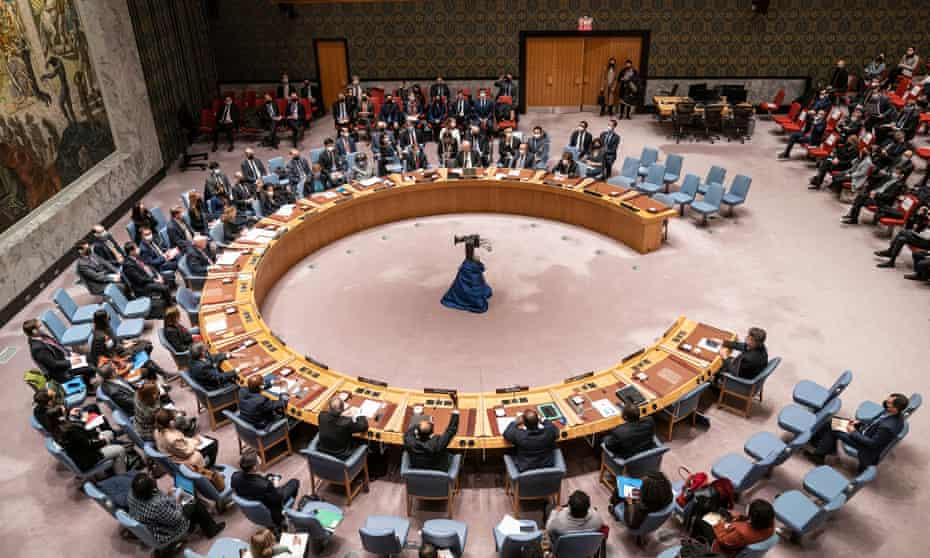Vladimir Tikhonov
3 h ·
중국은....사실 냉정하게 생각하면 현 상황은 중국으로서는 불리한 점보다 유리한 점들이 더 많습니다. 불리한 점은 우크라이나에서 여태까지 얻은 경제적 이권들이 전시에 무용지물이 됐다는 것이죠 (우크라이나도 일대일로 프로젝트의 일부분이었고, 중국이 우크라이나 농토 등을 사들이고 있었죠). 유리한 점은, 러시아가 서방으로부터 고립 당할 수록 중국 의존도가 폭발적으로 늘어난다는 점입니다. 사실 중국은 총 한번 안쏘고 엄청난 경제 영토를 지금 획득하게 되는 것이죠. 러시아에서 서방 기업들이 빠지면 중국으로서는 천추의 기회가 생기는 거죠. 또 하나의 유리한 점은, 대만 "해방" (?) 시나리오 짜기 위한 참고 자료가 지금 생기는 것입니다. 오늘날 상황을 보면 이 경우에는 침략을 당하는 지역의 주민들의 반응이나 서방 측 반응, 서방 측이 취할 수 있는 대응 방식 등을 체크할 수 있는 것이죠. 대만에서 우크라이나 사태와 같은 일들이 일어난다면, 사실상 세계 경제가 "양분"을 당하게 될 것입니다. 중국이 기존의 (서방 중심의) 세계 질서를 탈퇴하여 북한과 러시아 등을 거느려 "제2의 자본주의 세계"를 구축하게 될 가능성이 있습니다. 만약 우크라이나에서의 저항이 비교적 빠르게 제압되고 괴뢰 정권이 세워지면, 이는 아마도 "세계 양분" 시나리오의 현실화의 가능성을 높일 것입니다. 우리 대한민국으로서는 최악 중의 최악이지요....이 시나리오가 현실화되면 남북 분단은 사실상 "영구화"됩니다. 정말 지옥적 시나리오에요....
Analysis: Beijing has held off from backing Russia, raising questions about the extent of any partnership
 The UN security council meeting and vote on resolution on war in Ukraine on 25 February. Photograph: Lev Radin/Pacific Press/REX/Shutterstock
The UN security council meeting and vote on resolution on war in Ukraine on 25 February. Photograph: Lev Radin/Pacific Press/REX/ShutterstockPatrick Wintour
Sun 27 Feb 2022 18.15 AEDT
China’s decision to abstain on Friday night at the end of the UN security council vote condemning the Russian invasion of Ukraine may be a source of deep frustration in the west, but it will also send a nervous tremor through the Russian ministry of foreign affairs that China’s protection is not unconditional.
UK-based diplomats, looking at the stance adopted by China in the middle of the week, were expecting Beijing to join Russia in voting against the US-sponsored motion, but in common with the United Arab Emirates and India, it abstained, leaving Russia isolated in deploying its veto power as a permanent member of the security council.
At one level, the vote represents the line of least resistance for China, and can be seen as a reversion to the safety of China’s long-standing support for the inviolability of borders, and advocacy of non-interference in the affairs of sovereign states. But there are tentative signs that China is uneasy at being seen to defend Putin’s methods, and the potential disruption to the world economy.
Putin may have shown his respect for China by delaying the invasion until after the Winter Olympics, but China was not consulted about the invasion. Chinese diplomats ridiculed forecasts of an invasion, and left many citizens in situ. The deeper partnership agreement signed with Russia on 4 February, the opening day of the Beijing Winter Olympics, was predicated on no invasion. China benefits from the existing world order, and finds the instability unsettling. The prospect of Russia being cut out of the Swift payment system may benefit Chinese efforts to build an alternative, but the short-term disruption is worrying.
Advertisement
It was noticeable, for instance, on Friday that Russia offered high-level talks with Ukraine in Minsk, albeit on unacceptable terms, after a conversation between Putin and President Xi Jinping.
Before the vote, the Chinese foreign minister took three calls from the foreign secretary Liz Truss, the EU foreign policy chief Josep Borrell, and Emmanuel Bonne, diplomatic counsellor to President Emmanuel Macron. China said in those calls it reiterated its support for non-interference, and the UN charter, but also expressed sympathy with Russia’s sense that it was threatened by Nato’s five successive rounds of expansion.
But even if China contorts itself by stubbornly refusing to describe Putin’s actions as an invasion, it has edged closer to including Russia in its criticism.
China on Friday emphasised that “it is absolutely imperative that all parties exercise necessary restraint in order to prevent the situation in Ukraine from deteriorating or even getting out of control. The safety of ordinary people’s lives and properties should be effectively safeguarded, and in particular, large-scale humanitarian crises have to be prevented.”
Ukraine, it said, should be a bridge of communication between the east and west, not the frontline of confrontations between major countries. That, by implication, suggests China would favour Ukraine being a neutral state.
The risk for Russia is that if it descends into pariah status, it will be left as a supplicant rather than a future partner with China. Within 10 years, Europe will have freed itself from dependence on Russian gas and oil – that has become a matter of urgent imperative in Rome and Berlin. Russia will be reliant on China as a customer.
There is a further danger for Russia. China prides itself on its influence in Africa. All the African representatives on the security council voted against Russia. The Kenyan ambassador did so by insisting that he had opposed previous western military interventions.
Further wider tests of African opinion are imminent.
Washington wants Russia’s culpability to be tested further before the 193-member general assembly at which all members vote. A broad alliance is forming behind Ukraine’s cause. In a debate on Wednesday countries from Guatemala to Turkey to Japan condemned Russia’s embrace of the separatist self-proclaimed republics, or voiced support for Ukraine.
In 2014, after the Russian capture of Crimea, the general assembly adopted a resolution declaring Russia’s referendum in Crimea invalid. It received 100 votes in favour, 11 against and 58 abstentions, while two dozen countries didn’t vote. The issues will be slightly different if there is a further vote, but the invasion has been more overt than 2014, social media more pervasive and China, its status growing on the world stage, finds it less easy to hide. With greater power perhaps will come greater responsibility.
No comments:
Post a Comment